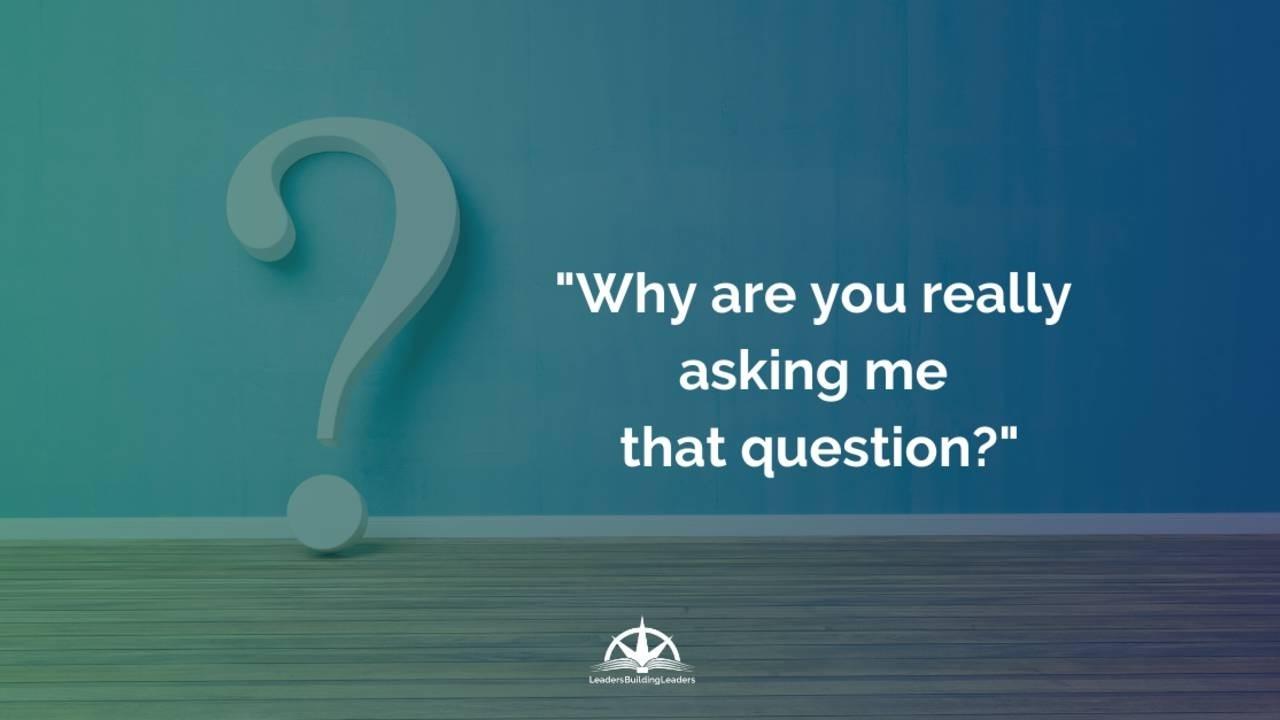Why Are You Really Asking Me This Question?

I believe that asking questions is the most powerful tool in leadership.
In John Maxwell’s Good Leaders Ask Great Questions, he notes:
- Questions unlock and open doors that otherwise remain closed.
- Questions are the most effective means of connecting with people.
- Questions cultivate humility.
- Questions help you to engage others in conversation.
- Questions allow you to build better ideas.
- Questions give you a different perspective.
- Questions challenge mind-sets and get you out of ruts
All of these points seem like excellent reasons why people should not only ask but also encourage others to ask questions because good questions inform and great questions transform.
However, lately, I have seen many relationships go awry because the individual being questioned has interpreted the inquiry as an attack rather than a simple means to attain more information and clearer understanding.
I have observed this type of interaction at charter school board meetings between the head of school and board members.
As an audience member, I do not always have all of the background information and I do know that board members can sometimes ask ridiculous questions; however, if a board member is asking surprising questions, it is usually the result of one of two issues:
- The principal has not done a sufficient job educating the board members on school operations.
- The board member wants to learn more so he/she can make better decisions.
Being able to take on a positive approach to questioning requires an open mindset, maturity, and confidence.
A school leader who responds defensively to questions can cause a breakdown in communication between the school’s constituents. The board may view the school leader as incompetent while the leader feels continuously vulnerable and under attack. This type of working relationship will impede board members from asking the necessary questions in order to identify, understand, and resolve key issues within the school’s operations. Instead, a massive struggle for power ensues and nothing gets done.
Perhaps this is why there has been over a 50% turnover in North Carolina charter school principals over in the past four years?
One example I observed a Treasurer on the board asked the head of school about the school’s annual campaign, “What specifically does the $100,000 campaign go to?”
When there was not a tangible response he noted, “As a parent, and donor, I think we should have a strategy that aligns with a clear communication plan to parents and donors, especially if we are about to embark on a capital campaign in the near future.”
For three consecutive months this particular board member noted his concern as the campaign crept towards its $100,000 goal.
The Treasurer's argument was that the school would reach the goal faster when we put a tangible vision behind the ask.
Over the next few months the relationship between the head of school and the Treasurer slowly eroded based on two things:
1. The leader felt uncomfortable with the question because they didn’t have an immediate response; and,
2. The board, as a whole, didn’t ask for a committee or the school leader to address this issue with a plan (i.e. committee to address).
As a result, the concern was continually brought up at meetings creating resistance and tension at the meeting.
As a school leader, I encourage you to change your perception when it comes to questions. An open mindset shows you understand the value of questions; you encourage the success of others; you are not threatened by others’ strengths; you bring out the best thinking in the people around you and you leave each meeting with a “we” attitude - not a “me” attitude.
Here are some steps to get you there: :
- Ensure large organizational decisions are addressed through a clear process involving committees (board or school team) to allow a deeper analysis and bottom up approach.
- Provide accurate board reports in a timely-manner (7 days in advance), which contain the necessary and vital information to work towards achieving the school’s mission and goals.
- Detail in the report the multiple stages and stakeholders involved to come to this recommendation.
- Call each board member prior to the meeting. Ask them if they have read the report and if they have questions. This way you make sure you have prepared answers to these questions by the meeting time.
- When it is time to address your report, start by asking, “You all received the report. What questions do you have?”
Remember, good questions inform and great questions transform.
Everyone views information through a different lens. It is alright to say, “That’s a great question and I will bring it back to our team for deeper investigation in time for next meeting or earlier if needed!”
Dr. Thomas Miller is a consultant, speaker and trainer for charter and independent schools. If you received value from this blog please feel free to share or comment. If you would like assistance in improving your governance and leadership practices I encourage you to take a look at our online and on-demand Education Governance Academy, "Navigate" or feel free to email [email protected] for more personalized support.
Join Our Daily Thought List!
Get daily inspirational messages and updates on our events and programs.

